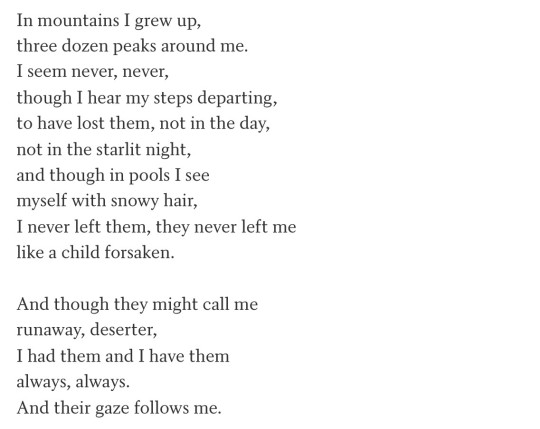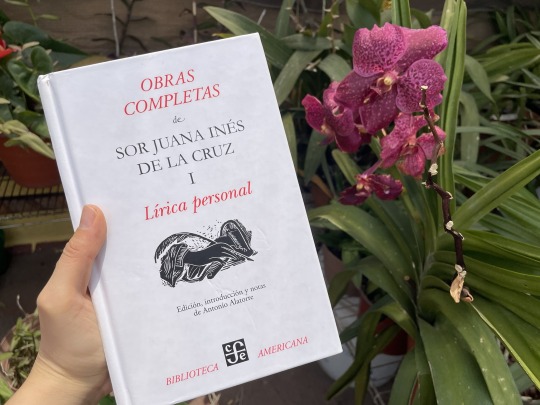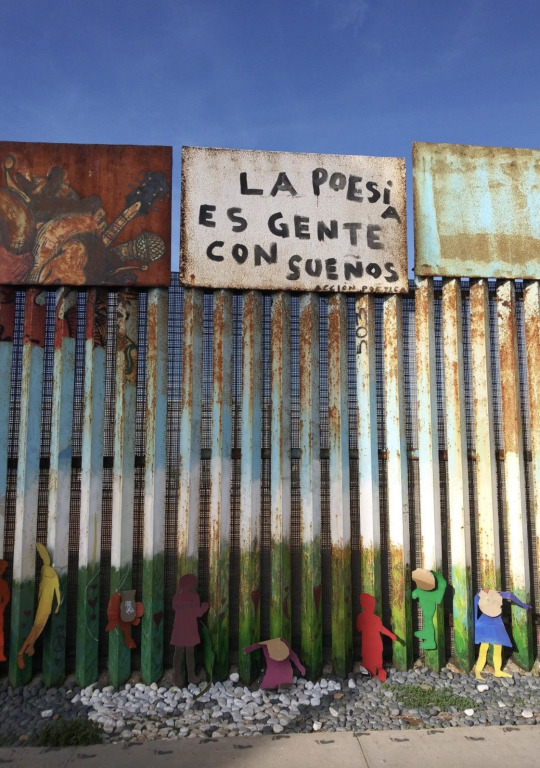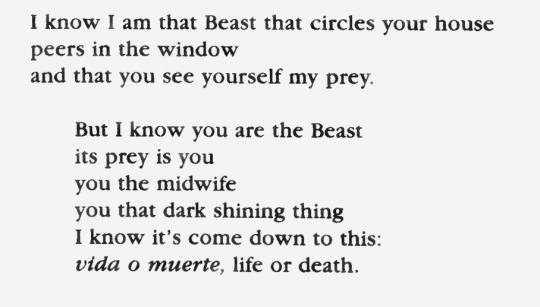#Mexican Poetry
Text

Rosario Castellanos, tr. by Magda Bogin, from The Selected Poems of Rosario Castellanos; "Two Poems"
[Text ID: "Beyond my skin, deep in / my bones, I have loved."]
#rosario castellanos#excerpts#writings#literature#poetry#fragments#selections#words#quotes#poetry collection#typography#poetry in translation#mexican literature#mexican poetry
2K notes
·
View notes
Text

My Mountains by Gabriela Mistral, translated by Ursula K. Le Guin
308 notes
·
View notes
Text
Quiero amar como lo haces tú.
Unexpected kisses, soft as velvet,
I flinch when you raise your hand
You raise another
in an attempt to reassure me
you're not like the many hands
I've felt before
My walls are paper thin
as long as you're the one
whose forcing himself in
#original poetry#original poem#queer poem#queer poetry#mexican poetry#mexican poem#poems on tumblr#poems and poetry#love poem#love poetry#poemsbyme#my poetry#rapeculture#rapeawareness#trauma
12 notes
·
View notes
Text

JOMP Book Photo Challenge || May || 21 || Read For School
#jompbpc#justonemorepage#book photo challenge#sor juana#sor juana ines de la cruz#poetry#mexican poetry#sor juana inés de la cruz#books and poetry#books and flowers#books and plants#booklr#bookblr#leerreadinglire
10 notes
·
View notes
Text

How can poetry relay the Mexican-American experience? In my opinion, literary media such as short stories or written poetry can be one of the best forms to encapsulate the realities of the diaspora.
But why do I think that? Well first, let's identify some common themes that characterizes Mexican-American poetry.
Cultural Expression and Identity: Mexican-American poets use poetry to express the richness of their cultural identity (Noel 160). Poets can draw on traditions, customs, folklore, and historical events to create a tapestry that reflects heritage (Noel 160). Through vivid imagery and symbolism, poets such as Sandra Cisneros convey the essence of Mexican/Mexican-American culture and its impact on sense of self.
Exploration of Gender: Mexican-American poets like Cisneros explore gender dynamics within the community. Poetry addresses traditional expectations, stereotypes, and the evolving roles of men and women (Mayock 223). Poetry becomes a medium for challenging cultural norms, creating a space for reflection on the complexities of gender identity within the context of both Mexican and American cultures (Mayock 224).
Migration and Displacement: The theme of migration is also central to many Mexican-American poems/poets. Poets like Cisneros can really capture emotions in the journey of leaving one's home, challenges of adapting to a new culture, and nostalgia for the motherland (Pearce 206). Through poetry, Mexican-American poets can share their narratives, which highlight the resilience needed in order to navigate the complexities of migration (Pearce 208).
5 notes
·
View notes
Text
"My mother told me that I cried in her womb. They said to her: he'll be lucky.
Someone spoke to me all the days of my life, into my ear, slowly, taking their time.
Said to me: live, live, live! It was death.
Mi madre me contó que yo lloré en su vientre. A ella le dijeron: tendrá suerte.
Alguien me habló todos los días de mi vida al oído, despacio, lentamente.
Me dijo: ¡vive, vive, vive! Era la muerte."
-"Del Mito" or "On Myth" by Jaime Sabines
16 notes
·
View notes
Text
Live, you said... may the sun kiss your skin, daily. I did. I do.
Maritza N. Estrada, Audience
#maritza n estrada#maritza estrada#poetry#poem#latin america#mexican poetry#words to live by#love poem
2 notes
·
View notes
Text
Thanacon PSA!!!
For those who are unaware, I have a tiktok where i write poetry.
No, its not that corny, Milk and Honey, plagiarized stuff
I'm from LA, mentally ill, Mexican, and bisexual. I can't stress the LA part enough. Rampart and Koreatown.
So you know its some of the most fucked up and insane shit ever.
Here's an example:

Give me a follow if that tickles your fancy.
my @ is thanapathic
XOXO - Thanacon
#thanaconspeaks#poetry#poems and poetry#poems#poems on tumblr#original poem#mental illness#mentally fucked#rotting in my room#LA#los angeles#queer poetry#queer poets on tumblr#queer poems#mexican poetry
3 notes
·
View notes
Text

I don't know if I'm sad for the souls
of my dearly departed
or because our withered hearts
will never be together on this Earth.
—Ramón López Velarde (1888-1921)
5 notes
·
View notes
Text
visión roja
Explotando como los
fuegos artificiales
Combustión espontánea
llamas de indignación
Hirviendo
Y más
fluido
como una olla de agua
Dejado desatendida
Fluidez en mi ira
No sigue ninguna dirección
Diarrea Verbal
La boca se mueve a la velocidad de la luz.
Lanzando palabras de animosidad
bolsas de naranjas
Palabras de rabia hieren el alma
Lesiones no visibles
dolor fantasma inquietante
Persistente en la parte posterior de la garganta
Acidez inducida por la ira en tu centro
Deja un sabor a melancolía.
y despecho
Manchando tu alma de amarillo
Cambiando
El Cerebro
Residuo canceroso
Como Esencia mutada
Superado por la amargura
Atrapado en un bucle perpetuo
La crueldad es una venganza contra los insultos.
7 notes
·
View notes
Text
At night, my lady is a river
(Réédition)
DAME HUATXEQUE
https://ibonoco.files.wordpress.com/2020/03/union-jack-two-full-moons-a-trout-caspar-pound-mix-94-version.mp3
A peine sortie du bain, nouvellement née de la nuit, nue, salutaire, elle rôde vers les lisières. Sur sa poitrine flambent des joyaux arrachés à l’été. L’herbe lisse, l’herbe bleue presque noire qui croît au bord du volcan, couvre son sexe. Dans son ventre un…

View On WordPress
2 notes
·
View notes
Text

Rosario Castellanos, tr. by Magda Bogin, from The Selected Poems of Rosario Castellanos; "The splendor of being"
[Text ID: "Ah, to wake, to live, / to love, to love the wind / as a bird loves!"]
#rosario castellanos#excerpts#writings#literature#poetry#fragments#selections#words#quotes#poetry collection#typography#poetry in translation#mexican literature#mexican poetry#life#survival#hope#love
581 notes
·
View notes
Text

that dark shining thing by Gloria Anzaldúa from Borderlands/La Frontera
3 notes
·
View notes
Text
There’s an anger that can only be resolved through sexual violence
Bruise my body
as I gnaw at your bones
We fuck like dogs
down here in the sewers
I look up at the manhole
and try to sneak a peek
of the moonlit sky
I feel an ungodly anger
towards myself for existing
and I want you to punish me for it
#original poetry#original poem#queer poem#queer poetry#mexican poetry#mexican poem#poems on tumblr#poems and poetry#love poem#love poetry#poemsbyme#my poetry#rapeculture#rapeawareness#trauma
8 notes
·
View notes
Text
Centro
Habitas como semilla que no ha nacido
En la oscuridad de mi pecho
Llena de secretas historias de amor
En silencio...
Alebrije brillante atrapado en mis sueños
Déjame reposar un poco mas en tus mejillas
Junto al aroma de otoño que te envuelve
Se que viviré solo detrás de tu escaparate
Siendo tesoro de extraño valor
Como el milagro de luna cada noche
Gracias al rayo de sol que escapó.
6 notes
·
View notes
Text

Sandra Cisneros conveys detailed instructions for the organization of her funeral in the event of her death. In her poem “Instructions for My Funeral” incorporates various cultural symbols, including copal (a tree resin used as a ceremonious incense since the time of the Maya/Aztec), her rebozo (a class Mexican women’s garment similar to a shawl), petate as a substitute for a standard coffin (a bedroll made from palm fibers dating back to Aztec times), and mezcal (a Mexican spirit that is drank collectively, a symbol of friendship and community) (Cisneros 3-5, 29).
In a notable departure from patriarchal Christian traditions, Cisneros explicitly rejects Christian rituals for her funeral, offering an alternative, “Allow no Christian rituals / for this bitch, but, if / you like, you may invite/... a witch woman to spit / orange water and chant / an Otomí prayer”(Cisneros 7-13). This choice reflects her preference for the indigenous practices rooted in the cultural environment of San Miguel de Allende, Guanajuato, Mexico (Cisneros, biography).
The poem’s significance is perhaps the most pronounced in a stanza in which Cisneros emphatically affirms her connection to her Mexican context: “Send no ashes north…/ I belong here, / under Mexican maguey / beneath a carved mesquite / bench that says Ni Modo” (Cisneros 14, 17-20). Even in death, Cisneros underscores that despite her American birth, her true sense of belonging ties her intimately to Mexico, not the United States.
2 notes
·
View notes